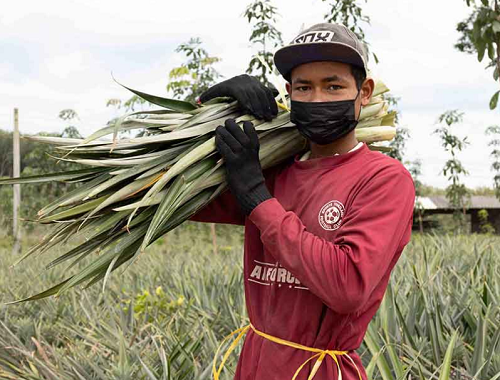What was waste is now a source of income for farmers. Courtesy NextEvo.
A Singapore-based startup is applying new technology to previously wasted agricultural by-products and turning them into biodegrabeable yarn for use in clothing. By James Teo.
Singapore. November 2021. “Transforming agricultural waste and natural fibres into useful applications is not a new concept,” says Harold Koh, CEO of newly established sustainability company NextEvo. “The key difference (we bring) is our ability to work directly with collective farmers and plantations across Southeast Asia, to source … the raw materials in abundance.”
Raw pineapple leaf fibre can be spun into composite yarn to create soft and warm fabrics. Courtesy NextEvo.
Koh knows what he is talking about. He worked for nine years as the CEO of one of the world’s largest pineapple producers in Thailand, and he knows first hand how much waste is produced.
Thailand produces over 1.5million tonnes of the fruit a year, and in most cases, the long fibrous leaves are just chopped off, burned, dumped in landfill, or left to rot. None of these solutions is helpful to the environment.
“We want to transform (this) agricultural waste into sustainable materials and products,” explains Koh. “Our recent (discussions) with … global and regional brands and manufacturers have all been positive. They are keen to participate in a long-term sustainability drive with us.”
Armed with this (literally) ground level support, Koh and his new team have researched a pilot to take the waste pineapple leaves, shred and extract fibre from them, then combine these with other fibres to make brand new thread. A thread which is perfect for cool, soft-touch fabric usage in jeans, sneakers, upholstery and towels. And using what would otherwise be wasted, it manages to be sustainable at the same time.
One of NextEvo’s key collaborators in the pilot project has been Jinny Tantipipatpong, chairman of major pineapple cannery SAICO. “I am glad to be part of NextEvo on this sustainability quest,” he says. “Utilising pineapple leaf waste not only contributes towards the circular economy but also improves the livelihoods of Thai farmers (that can now sell it).”
Tantipipatpong says that tying up with NextEvo enables pineapple farmers to be part of an integrated supply chain that reliably delivers leaves, then ready-to-spin fibres to the yarn manufacturing process.
“We want to transform agricultural waste into sustainable materials.” - Harold Koh.
So farmers can now collect their pineapple leaves and turn them into value-added materials for the textile industry. With around 100,000kg of pineapple leaves being harvested daily, that’s a lot of potential fibres, a significant boost to their income – and more sustainable t-shirts.
NextEvo’s new process strips the leaves down mechanically, cleans them and bundles them into balls ready to spin and be added to other fibres such as organic cotton, lyocell and reclaimed and recycled polyester – to be spun into weavable yarn.
Koh says that the new company is on target to start producing commercial quantities of the new product by Q1 2022. The year-long pilot has gone from product development, proof-of-concept, practical trial right through to initial production.
“We are committed to doing our part for People and Planet,” say the company. “This sustainability will be scalable through (our) access to plantations and farms and social cooperatives in Southeast Asia.
The gathered leaves are mechanically stripped of their fibre content. Courtesy NextEvo.
“Engagement with these stakeholders will not only supplement their incomes, but also prevent disposal of massive amounts of waste.”
NextEvo says the new initiative could positively impact the lives of 5,000 farmers over the next three years.
Buoyed with the success of its initial waste agriculture recycling, NextEvo is already looking at the next project – recycling coconut husk waste. The husk of coconuts – currently discarded and mostly burnt - consists of very strong fibres which can be converted into value-added items like ropes, bio-degradable chairs and erosion control matting. Chopped up and composted coco-husk can also be used for hydroponic agriculture. The potential, says NextEvo, is massive.
“At NextEvo, we want to create impact in the world by driving sustainability with scalability that makes sense for both the environment and society,” says Koh.



